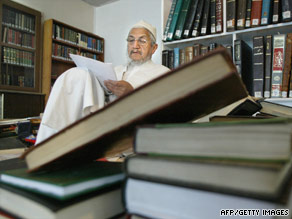
Top clerics and seminary students in Iran’s holy city of Qom have come out against the results of the disputed June Iranian presidential election, which was declared a landslide victory for the hard-line incumbent.
The Association of Teachers and Researchers of the Qom seminary school issued a statement on Saturday, saying that the election was skewed. The statement is a significant strike against Iran’s supreme leader, Ayatollah Ali Khamenei, who sides with the incumbent, President Mahmoud Ahmadinejad. It was released the same day that a former Iranian president, who backed the top opposition leader in the election, delivered strong and carefully worded support of the grass-roots protest movement. Several grand ayatollahs have also voiced their concerns over the elections. Former President Ali Akbar Hashemi Rafsanjani — who heads the group responsible for appointing or removing the supreme leader and is a supporter of opposition leader Mir Hossein Moussavi — said he doubted that “any informed conscience would be satisfied with the resulting situation,” according to the semiofficial Iranian Labor News Agency. On Friday, Grand Ayatollah Saanei posted a message on his Web site, stating, “A large portion of the people have not been convinced over the ambiguities in the election. … Due to the lack of public support, the government may face legal and civil problems and a lack of competency.” The controversial June 12 election prompted two weeks of widespread street protests and civil unrest that led to the death of at least 20 demonstrators and the arrest of more than 1,000, according to Iranian state-run media. The numbers of casualties and arrests could not be independently verified because of restrictions on international media. Iranians took to the streets with reason, according to the clerics’ statement, which said:
Don’t Miss
Moussavi said to be planning new party after Iran vote
Report: Iran to prosecute satellite TV contributors
Rafsanjani doubts Iranians ‘satisfied’ with election aftermath
In depth: Iran Election Fallout
“It is astonishing that an election, which in plain sight of all, extensively used public funds in order to promote one of the candidates and employed government power to bring in votes. The (state-run) national media was continuously working with different excuses to benefit and openly promote the advantages of one candidate only.” The statement went on to challenge the handling of ballots during the election, saying that the observers who were legally required to be present before the ballots’ sealing were allowed in only after the boxes were sealed at most voting stations. “Therefore we were faced with situations of having more votes than voters. It is very unfortunate that with the great haste in the announcement, there was considerable political capital invested from the supreme leadership,” the statement said. The clerics’ statement also referred to the rights of “respected candidates whose rights were violated,” singling out individuals such as Moussavi, whom many analysts had expected to win the election. Rafsanjani — a key politician in the Islamic republic — has also become increasingly vocal about the election results. “People from across the country participated in the elections, with excitement,” the Iranian Labor News Agency quoted Rafsanjani in a Saturday story. “But unfortunately the events that occurred after that and the difficulties created for some, left a bitter taste, and I don’t think that any wakened consciousness would be satisfied with the resulting situation.” He referred to the recent expressions of opinions across the country regarding the election crisis as a reflection of a power struggle “at the highest levels of the system.” “I hope that with proper management and fortitude, in the next few days, we can be witnesses to the betterment of the situation, resolution of the difficulties and the decrease in the number of the families waiting for their loved ones,” Rafsanjani said. “We must think about safeguarding the long term interests and benefits of the system.” While the protests over the election results mostly dissolved last week, those dissatisfied with the system continue to chant “Allahu Akbar” — God is great — from the rooftops in Tehran. Based on amateur footage viewed by CNN, the nighttime chanting went into its 21st consecutive day Friday. Last week, Iran’s election authority, the Guardian Council, said it considered the election outcome a closed case.